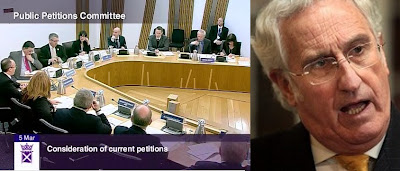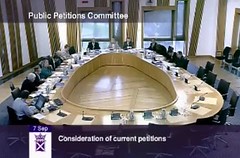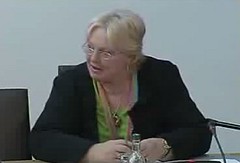More questions than answers emerge from private meeting between politicians & top judge. A PRIVATE MEETING between Scotland’s top judge Lord President Lord Brian Gill and two MSP members of the Scottish Parliament’s Public Petitions Committee over a PUBLIC PETITION calling for judges to declare their full interests in court has raised serious questions over how far the judiciary are willing to go to avoid declaring secret wealth, hitherto unrevealed business links & family connections within the legal sector, allegations of offshore interests and even criminal convictions for benefits cheating.
The unprecedented private meeting between Lord Gill, Convener David Stewart and Deputy Convener Chic Brodie MSP and the Clerk to the PPC in attendance, became the subject of heated debate at this week’s Petitions Committee meeting on Tuesday.
The private meeting with the Lord President, held away from deliberations of the full Petitions Committee, came as a compromise solution because Lord Gill refused several invitations to appear before the Petitions Committee during 2013 to face questions on, and account for his vociferous opposition to a call for transparency over how judges recuse themselves in court and how judicial interests are not being properly declared.
Petitions Committee Meeting 28 January 2014 (Click to view video footage)
During the meeting, an account was given by the Convener & Deputy Convener of what had been said at the private meeting with Lord Gill. However, no written notes of the meeting had been handed to members of the Committee in advance of Tuesday’s Public Petitions Committee meeting, which caused some members to raise questions of the whole issue of Lord Gill refusing to appear before the Scottish Parliament on this issue.
Raising the issue of minutes of the private meeting with Lord Gill, John Wilson MSP asked the Convener if any notes of what was discussed at the private meeting were going to be placed on the official record of the Committee. Jackson Carlaw MSP also pointed out that had it not been for tenacity of this committee so far, there would be no letter forthcoming from the Lord President.
The day before the Public Petitions Committee met, it was reported on Diary of Injustice that limited declarations of interest by Scotland’s top judge and only six other members of Scotland’s vast, sprawling ranks of a multi million pound well salaried & well pensioned judiciary were published in the 2012-2013 Annual Report of the Scottish Court Service, a fact which Lord Gill omitted to tell MSPs in three ‘stonewalling’ letters of protest against the petition which the Lord President sent to msps last year.
The full article reporting on Lord Gill’s limited declarations, is available here: M’Lud’s Interests: What Scotland’s top judge did not tell Holyrood MSPs when he refused to give evidence on register of judicial interests
From the Petitions Committee’s own records, it transpires MSPs were informed of Lord Gill’s limited declaration in the SCS annual report during November 2013 by the petitioner, and a submission was published by the Scottish Parliament’s own website at that time, available here: PE1458/T: Petitioner Letter of 14 November 2013 (9KB pdf)
However, during Tuesday’s meeting earlier this week, an account given by the Deputy Convener to Committee members appeared to suggest the declarations by Lord Gill had come as a revelation from the Lord President himself during the private meeting which occurred only two weeks ago, leading some to feel Lord Gill is choosing a divide and conquer approach to how he responds to questions asked in private meetings, compared to questions raised by the Petitions Committee in published letters.
It was also reported to the Committee that Lord Gill had told both MSPs during the private meeting he would tinker with his apparently complicated computer systems to ensure data on judicial recusals was easier to come by for members of the public, albeit missing the point about publishing details of declarations of interest – called for by the petition itself.
However, the Lord President’s IT suggestion was today branded “laughable” by court sources who themselves have frequently said they find it difficult to even publish complete transcripts or verbatim final opinions delivered by judges in Scotland’s highest court, the Court of Session
The limited declarations, required for the positions on the Scottish Court Service Board, appear to fly in the face of a series of excuses, complaints, accusations and veiled threats made by the Lord President in writing against the idea of creating a publicly available register of judicial interests, and raise questions over how Lord Gill has handed the judiciary’s battle against what is a simple call for transparency, itself supported by the Judicial Complaints Reviewer (JCR).
Moi Ali, Scotland’s first Judicial Complaints Reviewer recently gave testimony to MSPs at Holyrood on the benefits of a register of judicial interests, reported along with video footage of the testimony, here : As Scotland’s top judge battles on against transparency, Judicial Complaints Reviewer tells MSPs judges should register their interests like others in public life
Any publicly available register of judicial interests which could be created from the aims of the petition, would take in the entire judiciary and have to show criminal convictions,professional & other relationships, undeclared earnings and business links to law firms, investments, property and memberships of organisations and other information which commonly appears on registers of interest throughout the public sector.
It has also come to light some of Scotland’s judges have not declared their interests or recused themselves in court in cases where persons have been wrongfully convicted of a criminal offence.
Victims of miscarriage of injustice have then have gone on to suffer even greater injustice when it was revealed the same judges who prosecuted them while serving as Prosecutors for the Crown Office, had then gone on to hear the wrongfully convicted person’s appeal without recusing themselves from hearing the case, and had then dismissed the appeal.
A report on how the failure of judges to recuse themselves or declare their interests in cases which have led to miscarriages of justice features here: Failure to Recuse : Evidence handed to MSPs in judicial register of interests proposal reveals judges who blocked injustice appeal failed to declare interests in court
Previous articles on the lack of transparency within Scotland’s judiciary, investigations by Diary of Injustice including reports from the Sunday Mail newspaper, and video footage of debates at the Scottish Parliament’s Public Petitions Committee can be found here : A Register of Interests for Scotland's Judiciary
Petition PE1458: Register of Interests for members of Scotland's judiciary is due to be heard again at the Scottish Parliament in some weeks time after a letter has been received from the Lord President, who is apparently still refusing to attend the Scottish Parliament and face open questions from all Committee members regarding judges hidden undeclared interests.


